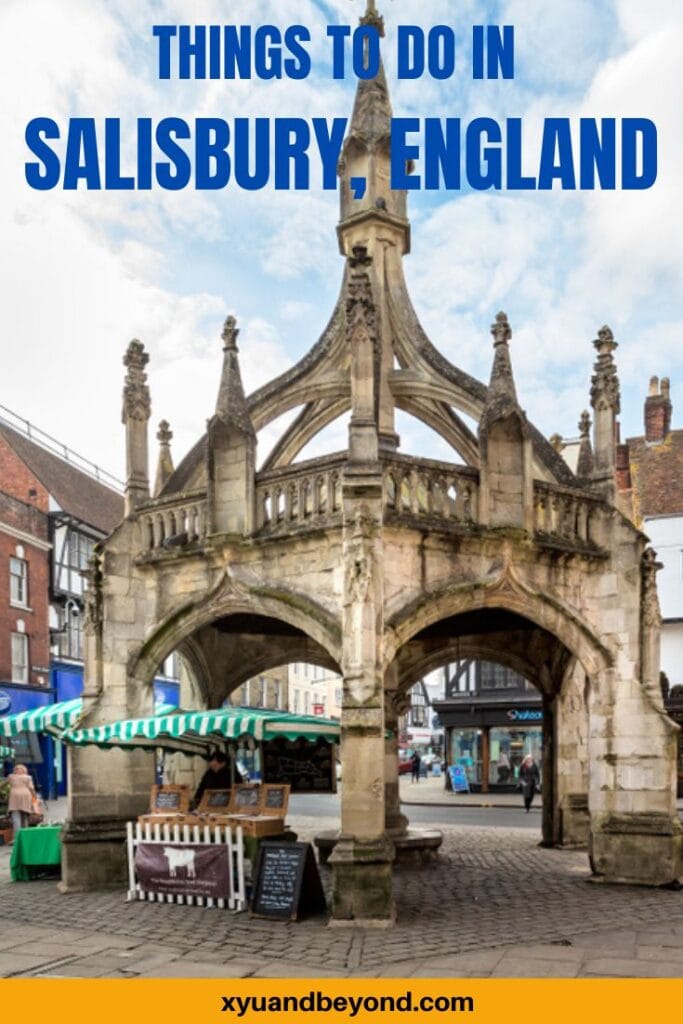22 of the best things to do in Salisbury England
Nestled in the heart of Wiltshire, Salisbury is a quintessential English city that boasts a rich history and charming vibe. From its iconic cathedral to its picturesque streets lined with independent shops and eateries, there’s no shortage of things to see and do in this cultural hub. Whether you’re a local looking for some new inspiration or a visitor planning your next trip, we’ve rounded up some top picks for what to do in Salisbury – so grab your walking shoes and get ready to explore!
Is Salisbury worth visiting? The city is best known for its iconic Cathedral, which has one of the four original copies of the Magna Carta, and the nearby Stonehenge monument, which attracts millions of visitors yearly.
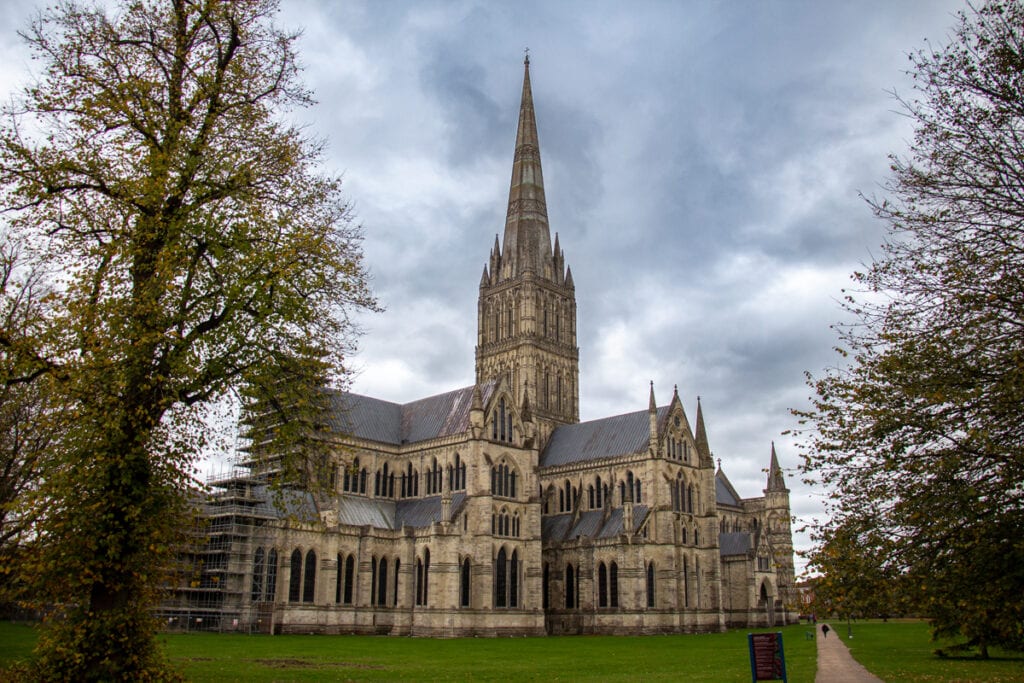
- 22 of the best things to do in Salisbury England
- Discovering Salisbury: A Guide to the Best Things to See and Do
- How to get to Salisbury
- Best things to do in Salisbury
- Salisbury Cathedral
- Gates of Salisbury
- Salisbury Plain
- Stonehenge
- Old Sarum
- Old Sarum Airfield – Boscombe Down Aviation Collection
- Salisbury Museum
- The Rifles Wardrobe and Museum Trust
- Mompesson House
- Wilton House
- The Close
- Arundells
- St. Thomas Church
- Salisbury Arts Center
- Harnham Water Meadows
- Salisbury Medieval Hall
- Salisbury Punting Company
- Poultry Cross
- Salisbury International Arts Festival
- Larmer Tree Gardens
- Queen Elizabeth Gardens
- Final thoughts about things to do in Salisbury
Xyuandbeyond is reader-supported. When you buy through links on our site, we may earn an affiliate commission. You can read my privacy policy here.
Whether you’re interested in art, history, or nature or simply want to relax and enjoy the English countryside, Salisbury has something for everyone.
We will take a closer look at some of the top attractions in Salisbury, England. Join us on a journey through Salisbury’s rich history and vibrant culture!
Discovering Salisbury: A Guide to the Best Things to See and Do
Pros and Cons of Living in the UK
How to get to Salisbury
Salisbury is about 2 hours west of London if you plan to drive, trains to the Salisbury rail station leave twice an hour from London’s Waterloo Station. The train trip from London takes about 90 minutes.
Best things to do in Salisbury
Salisbury Cathedral
Salisbury Cathedral is one of the most famous cathedrals in England. It is the final resting place of Lady Katherine Grey, the younger sister of Lady Jane the nine days Queen of England. Salisbury Cathedral is also the burial place of Elizabeth I’s lady-in-waiting, Helena Snachenberg and her husband.
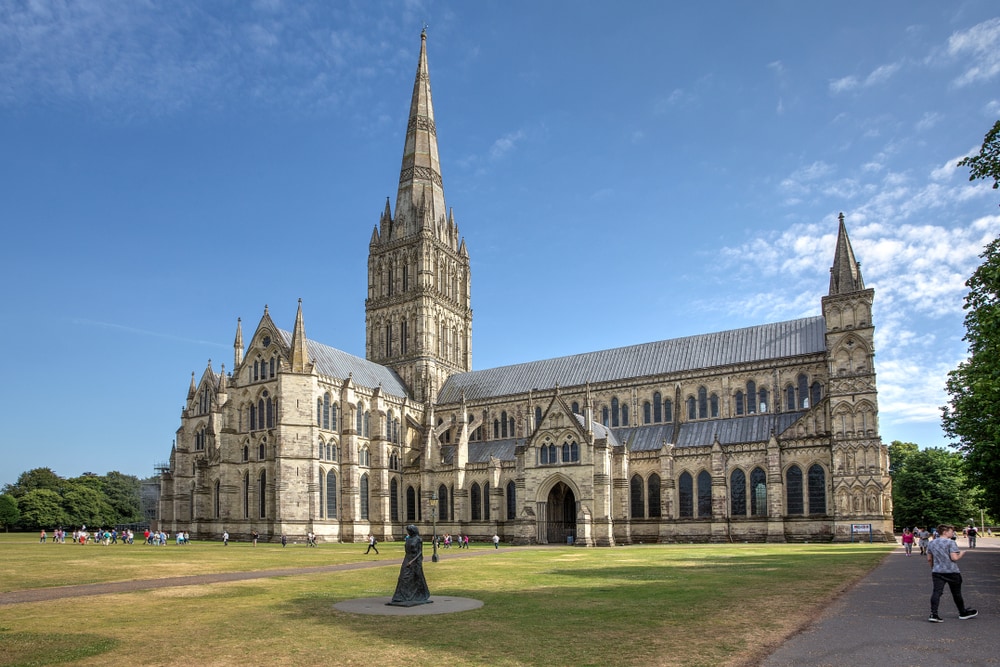
Salisbury Cathedral was built in the 13th century. It houses one of the four original copies of the Magna Carta which was signed by King John in 1215. The others are held in Lincoln Castle and the British Library. Its incredible architecture includes a spire that is the tallest in the UK at 404 feet it has the oldest working clock in Europe (1386); it has the largest cathedral cloisters and cathedral close in Britain; the choir (or quire) stalls are the largest and earliest complete set in Britain. Its vault is also the highest in Britain.

The famous architect Sir Christopher Wren (1632-1723) visited Salisbury Cathedral in August 1668 to assess the condition of the building. In his report, he noted that the Spire had shifted slightly from its correct upright position. To fix it, he recommended adding strong iron bands to the inside of the Spire.
Gates of Salisbury
There are four original city gates to see in the city and it’s one of the best things to do in Salisbury if you want to continue your time exploring this area’s long history.
Highgate is one of five gates in Salisbury’s ancient city wall and one of the four original gates, the High Street Gate joins St Ann’s Gate, the Queen’s Gate, and St Nicholas’s Gate.
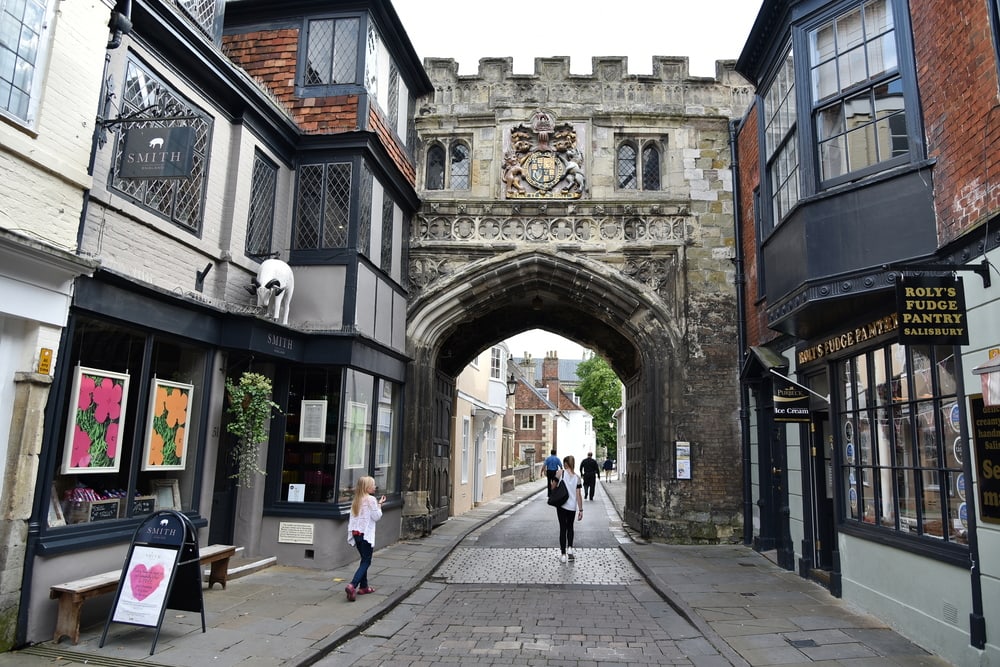
St Annes Gate is one of the entrances to the Close of Salisbury Cathedral, the biggest close in England. The gate was built around 1331. In 1219, Bishop Richard Poore got the go-ahead from both the Pope and the King of England to build a new church. He chose the site of Salisbury today. He called it “New Sarum.” The legend goes the bishop shot an arrow over the River Avon and killed a deer. He decided to build where the deer fell.
Next door to the Gate is the Malmesbury house. King Charles II stayed here I 1665. He and his entourage left Plague-ridden London to protect themselves. The chapel above the gateway was dedicated to St Anne and the Virgin Mary. After the Reformation, it was a music room. The great German-British composer George Handel gave his first concert in England here.
Salisbury Plain
Salisbury Plain is one of Britain’s best-known open spaces, consisting of a flat area covering about 300 square miles, in the county of Wiltshire. The largely treeless tract is famous for Stonehenge and its use by the military. The Chiltern Hills are a chalk escarpment in England that stretches in a southwest to north-east diagonal from Goring-On-Thames in Oxfordshire through to Bedfordshire. The Chilterns are part of the Southern England Chalk Formation which also includes Salisbury Plain, Cranborne Chase, the Isle of Wight and the South Downs.
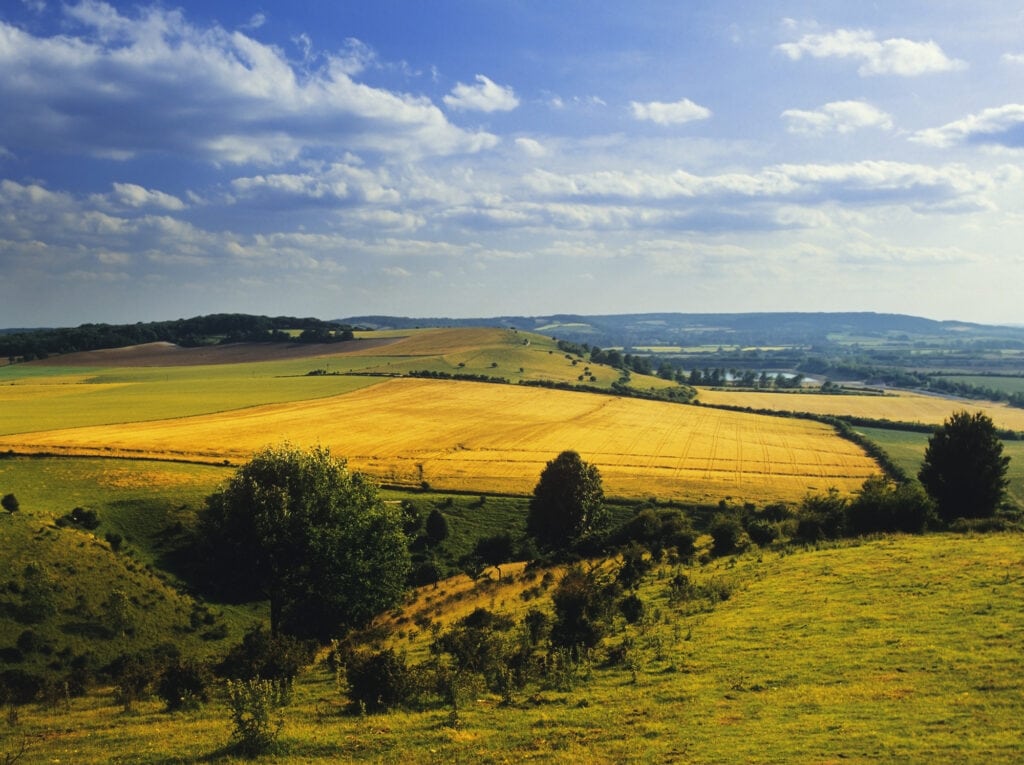
Stonehenge
Stonehenge, and Avebury, UNESCO World Heritage Sites are internationally important for their complexes of outstanding prehistoric monuments. Stonehenge is the most architecturally sophisticated prehistoric stone circle in the world, while Avebury is the largest in the world.
Stonehenge is located about 8 miles north of Salisbury and is one of the most famous ancient sites in the world. The monument consists of a circle of standing stones, some weighing over 40 tons, arranged in a pattern that has puzzled scholars for centuries.

Stonehenge is believed to have been constructed over 4,000 years ago. Historians and archaeologists still debate its purpose and significance. Nevertheless, it remains a fascinating and awe-inspiring sight, attracting millions of visitors annually.
Old Sarum
Old Sarum is an archaeological site in Wiltshire, England, that was the location of an Iron Age hill fort, a Roman Settlement and later a medieval castle and cathedral. The site is situated on a hill near the modern town of Salisbury and was inhabited for over 5,000 years before eventually being abandoned in the 13th century.
In the Iron Age, the site was a hill fort and a centre for trade and commerce. Later, in the 11th century, a castle was built at Old Sarum by William the Conqueror, which served as a royal residence and a seat of government for the region. A cathedral was also built at the site in the 12th century, which became an important religious centre for the area.
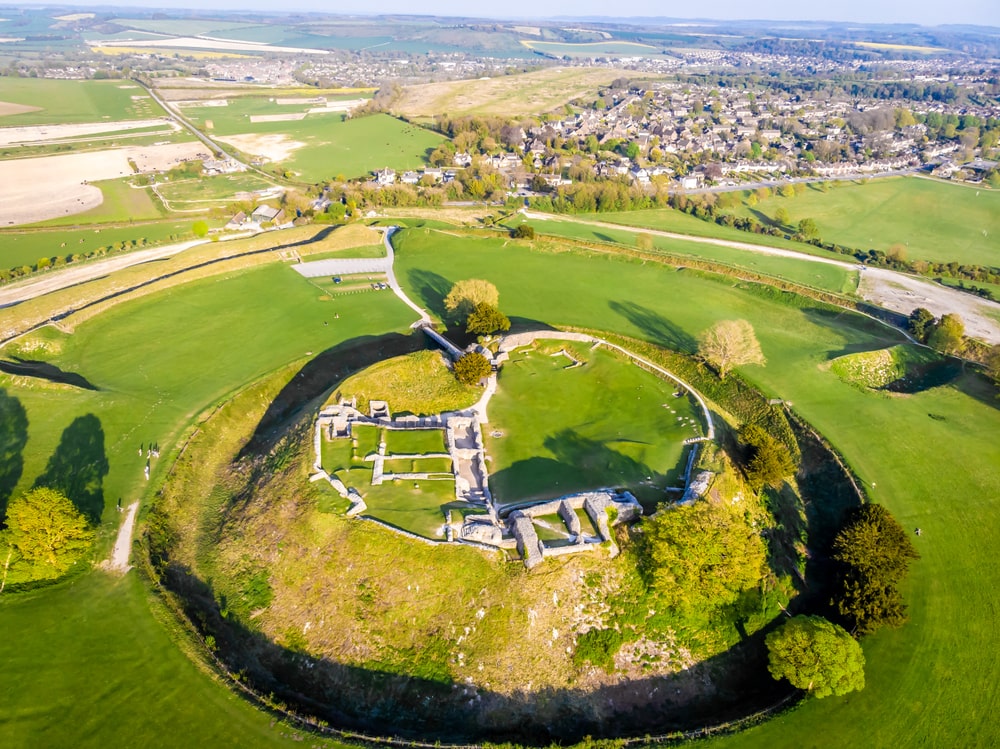
The site was abandoned in the 13th century in favour of a new settlement that eventually became the city of Salisbury. Today, Old Sarum is a popular tourist attraction and an important archaeological site, offering visitors a glimpse into the history of the area.
Old Sarum Airfield – Boscombe Down Aviation Collection
The site of Old Sarum Airfield was requisitioned by the War Office in 1917 for use by the Royal Flying Corps. Initially known as Ford Farm the Airfield provided a base for flying and fighter training.
On 1 April 1918, the Royal Air Force was formed and the site was renamed Old Sarum Airfield, probably after the Iron Age hill fort close to its western end.

In early 1940, the first two Royal Canadian Air Force squadrons arrived in Britain and were stationed at Old Sarum. These airmen were later to play a vital role in spotting targets for artillery and naval guns.
Old Sarum was attacked during the Battle of Britain but did not suffer significant damage. The Airfield played an important role in the D-Day landings. In 1944, ahead of D-Day, flying was suspended. Around 1,000 fitters were posted in to waterproof around 25,000 invasion vehicles – Operation SNUG.
Salisbury Museum
The Salisbury Museum is an excellent destination for anyone interested in history, archaeology, and art. The museum has an impressive collection of artefacts related to Stonehenge along with items from local excavations including Roman and Medieval periods.
The Museum also houses a stunning collection of works from artists such as John Constable and J.M.W. Turner. The museum tells the story of Salisbury and the surrounding area along with its history including England’s Civil War Period.
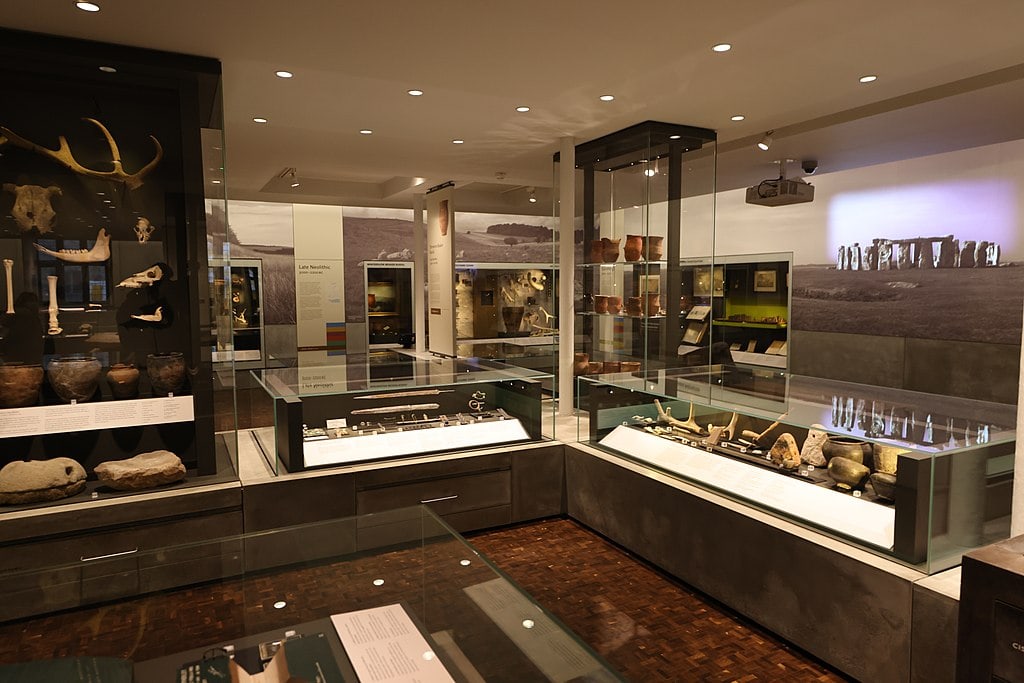
The Rifles Wardrobe and Museum Trust
The Rifles Berkshire and Wiltshire Museum is a great military museum that combines the collections of the Royal Berkshire and Wiltshire Regiments, both historic infantry regiments with long lists of battle honours to their names. It’s also one of several museums dedicated to their descendant regiment The Rifles – the largest infantry regiment in the British Army.
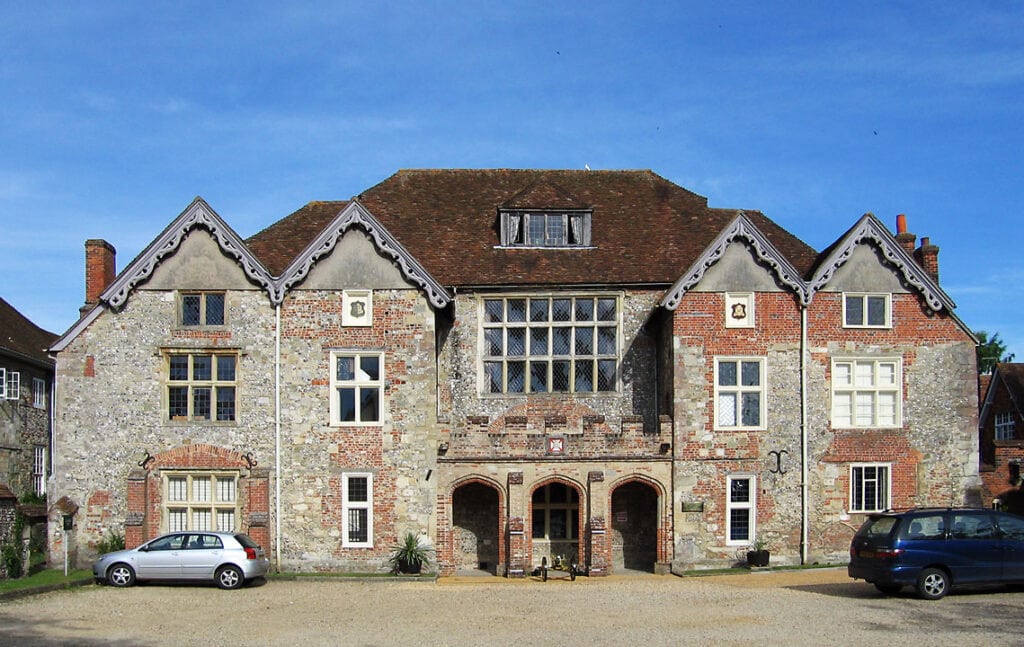
Mompesson House
Mompesson House is a historic townhouse operated by England’s National Trust located in the city of Salisbury, England. The house was built in 1701 for Charles Mompesson, a wealthy silk merchant and Member of Parliament. It is considered one of the finest examples of Georgian architecture in Salisbury.
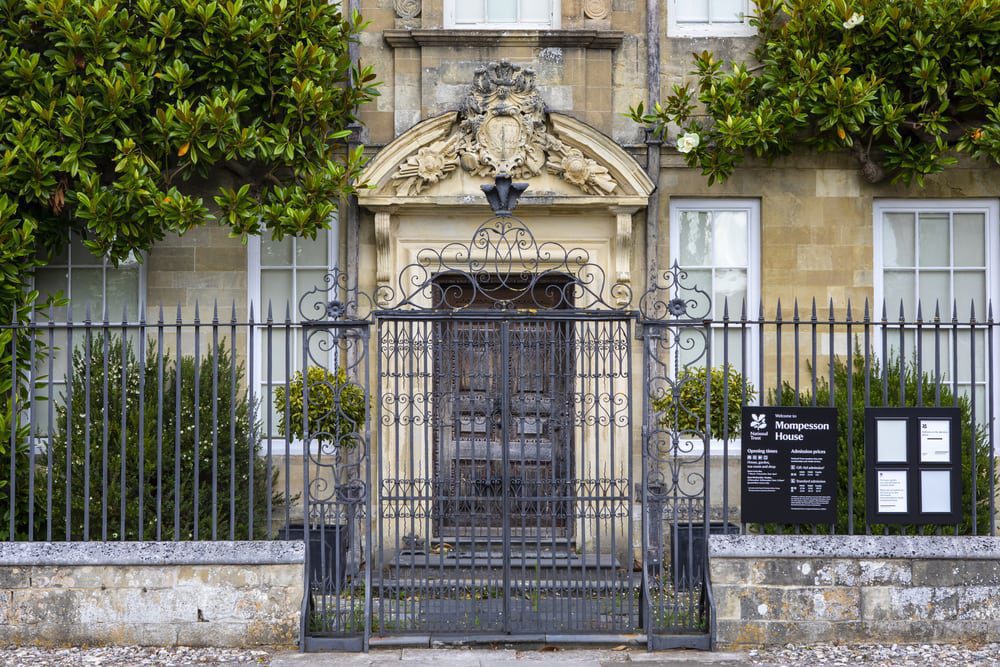
The house has been well-preserved and restored over the years and is now open to the public as a museum. Visitors can explore the elegant rooms, which are furnished with period furniture, paintings, and other decorative items. Some highlights of the house include the grand staircase, the drawing room with its ornate plasterwork ceiling, and the collection of 18th-century drinking glasses and the stunning walled gardens.
Wilton House
Wilton House is a country house located in Wilton, near Salisbury in Wiltshire, England. It has been the ancestral home of the Earls of Pembroke for over 400 years and is considered to be one of the finest examples of Palladian architecture in England.

The original house was built on the site in the 16th century, but it was extensively remodelled by Inigo Jones in the 17th century for the 4th Earl of Pembroke. The house features a stunning double cube room, which is one of the most impressive rooms of its kind in Europe. It also has a collection of fine art, including works by Van Dyck, Rembrandt, and Reynolds.
Wilton House is open to the public, and visitors can explore the house and its extensive grounds, which include beautiful gardens, water features, and sculptures. The house is also used as a filming location and has been featured in a number of movies and TV shows, including The Crown and Pride and Prejudice.
The Close
The Close is a picturesque and historic district in Salisbury, Wiltshire, UK, because it is the site of the original medieval city of Salisbury. The district is surrounded by a wall and moat and contains many notable landmarks, including Salisbury Cathedral, which is one of the finest examples of Gothic architecture in Europe.
The Close was built in the 13th century and was originally designed to be a fortified area for the bishop and clergy of Salisbury Cathedral. The buildings within the Close were constructed using locally sourced stone and were built to withstand attack, which is why many of them still stand today.
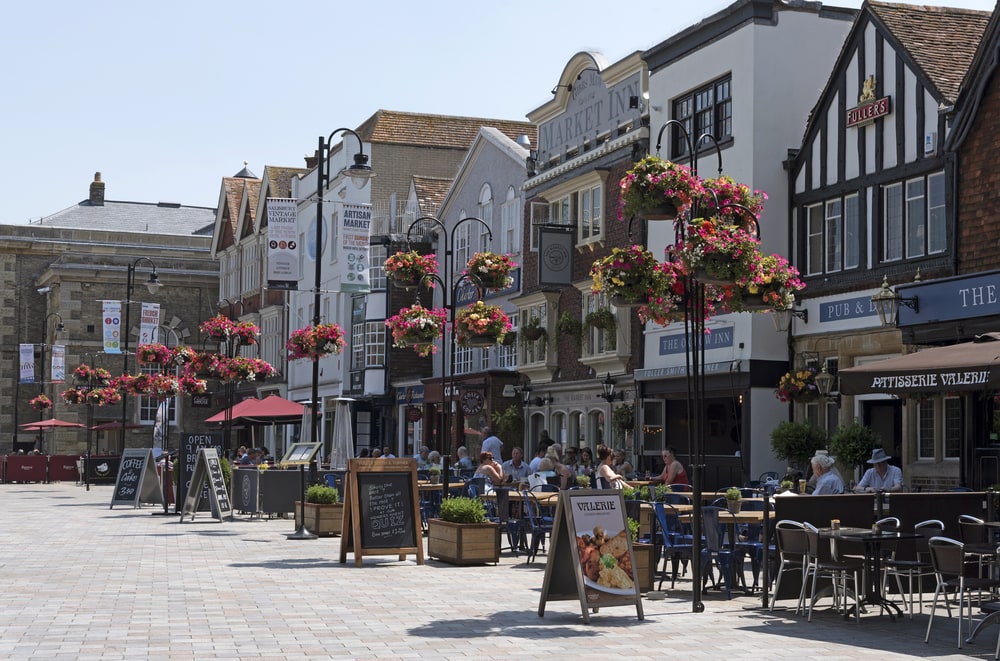
Over time, the Close has become a popular tourist destination due to its stunning architecture, beautiful gardens, and rich history. Visitors can explore the narrow streets, admire the medieval buildings, and take in the beautiful views of Salisbury Cathedral.
In addition to its historical significance, the Close is also a vibrant community that is home to a number of shops, restaurants, and cultural institutions. All of these factors contribute to the Close’s reputation as one of the most beautiful and unique districts in the UK.
Arundells
Arundells is a magnificent Georgian townhouse that is located in Cathedral Close. It is famous for being the former home of controversial Prime Minister Edward Heath, the UK’s Prime Minister from 1970 to 1974. Today, the house is open to the public as a museum, showcasing Sir Edward’s many collections.
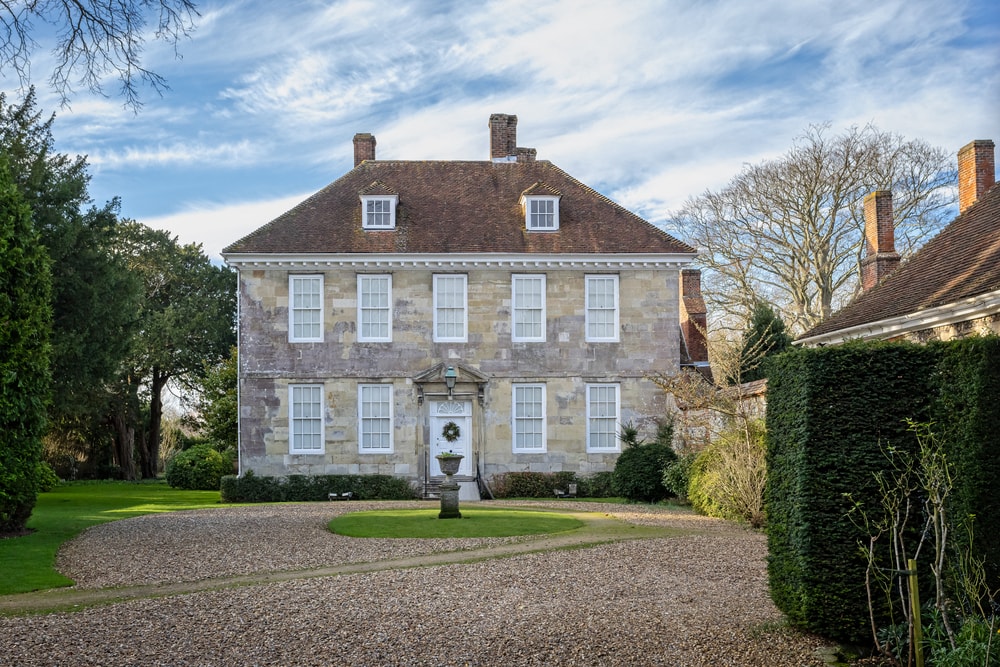
Tourists on a visit to the house are allowed to explore the elegant rooms of the house, which are filled with priceless artefacts and art objects that have spanned decades. The house’s interiors are just as fascinating as its exhibits, with richly decorated rooms designed to taste.
The house has a library, which contains over 3,500 volumes of books, many of which were collected by Sir Edward. Visitors can browse through the collection and learn about the former Prime Minister’s literary interests and influences to know more about what he is like.
St. Thomas Church
St. Thomas’s Church is a historic church located in the city of Salisbury, England. It is situated on the corner of St. Thomas’s Square and St. Ann’s Street, just a short walk from Salisbury Cathedral.
The church is primarily built in the Gothic style and is constructed of local Chilmark stone. Its most distinctive feature is its tower, which is 156 feet tall and has a spire that reaches a height of 186 feet. The tower is adorned with a clock face on each side, and its eight bells chime every quarter of an hour.
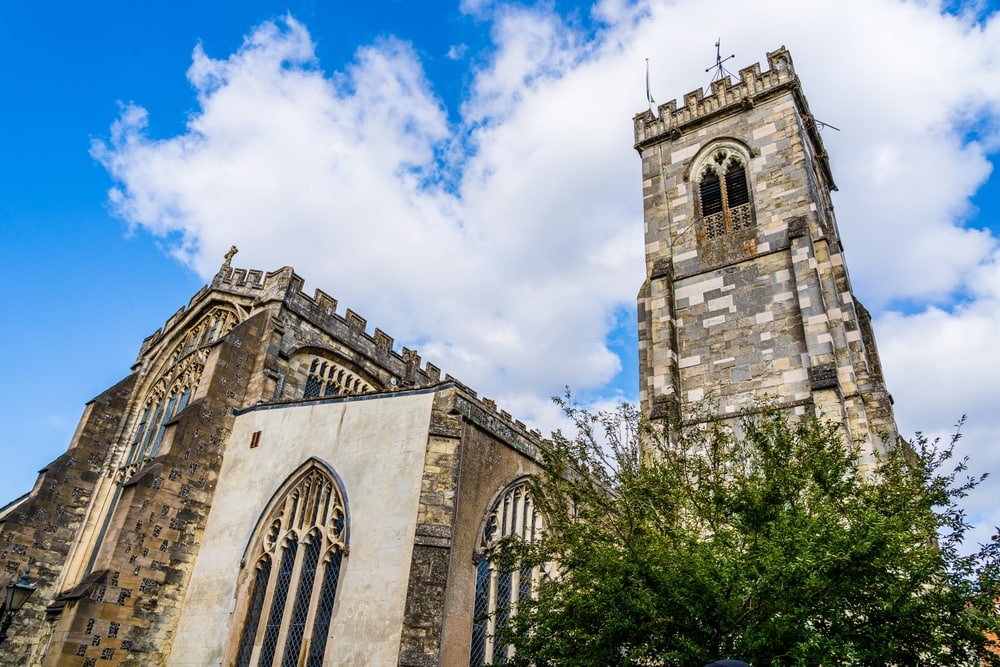
Inside, the church features a nave with an aisle on either side and a chancel with a decorated wooden roof. The nave has a number of interesting features, including a font that dates back to the 15th century and a number of memorials to local residents. The chancel is home to a beautiful stained-glass window that depicts the Last Supper.
Salisbury Arts Center
Salisbury Arts Center is a fantastic cultural entertainment hub in the city centre. The Center hosts various events and exhibitions, including art shows, music performances, and theatre productions.

Visitors can enjoy a night out at the centre and experience the best of local and international talent. The Center also offers educational programs and workshops for people of all ages, making it an excellent destination for family outings.
The Salisbury Arts Centre is housed in a beautiful Grade II listed building. It has a range of spaces for exhibitions and performances. The main auditorium can seat up to 200 people and has state-of-the-art sound and lighting systems.
The Center also has a gallery space that features regular exhibitions from local and international artists. Visitors can purchase artwork from the exhibitions and support the local art scene.
Harnham Water Meadows
Harnham Water Meadows is an area of grassland and wetland in Salisbury, Wiltshire, England. It is a floodplain meadow that has been managed for centuries using a traditional method of controlled grazing, which involves allowing livestock to graze in the meadows during the winter months when the ground is firm, and then removing them before the spring floods arrive. This practice helps to maintain the unique flora and fauna of the meadows and supports a variety of plant and animal species, including rare orchids and water voles.
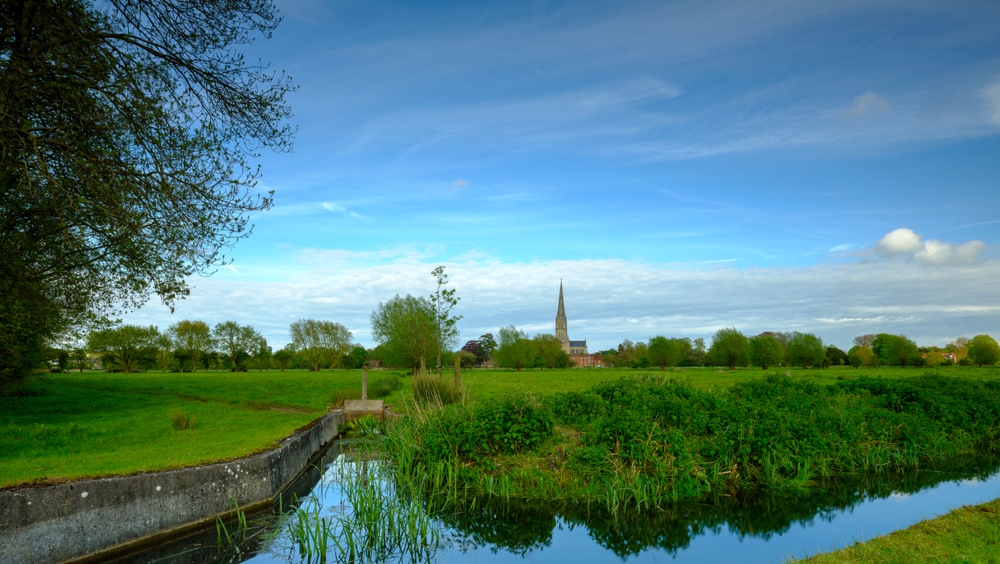
The meadows are also important for their historical and cultural significance, as they have been used for agriculture and grazing since medieval times. In recognition of their ecological and cultural value, Harnham Water Meadows have been designated a Site of Special Scientific Interest (SSSI), and are managed by the Wiltshire Wildlife Trust.
Salisbury Medieval Hall
Salisbury Medieval Hall also known as the Merchant’s House is a historic building located in the city of Salisbury, England. It was built in the late 13th century as a house for a wealthy wool merchant and his family and is one of the best-preserved examples of a medieval merchant’s house in the country.
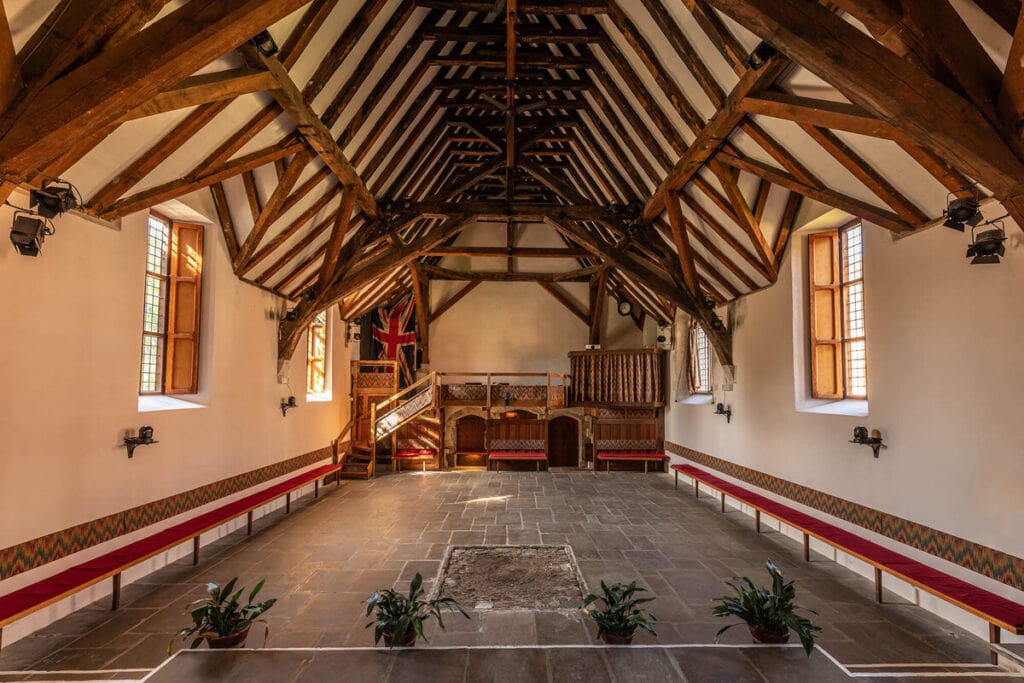
The house consists of a large stone hall, which would have been used for entertaining guests and holding feasts, and a range of smaller rooms including a kitchen, buttery, pantry, and private chambers. The building has undergone several renovations and changes over the centuries but still retains many of its original features including a magnificent hammer-beam roof, a minstrels’ gallery, and a rare surviving medieval wall painting.
Salisbury Punting Company
A punting tour on the Avon river is a must-do when in the area The Salisbury Punting company offers tours for £20 per adult and the tour is approximately 45 minutes. The tour takes in sites from the river such as the Medieval Hall, the Salisbury Museum and great views of Salisbury Cathedral.

Poultry Cross
The Poultry Cross is a beautiful medieval monument located in the heart of Salisbury’s historic marketplace. It dates back to the 15th century and was originally used as a meeting point for traders and merchants who sold poultry and other goods in the market.
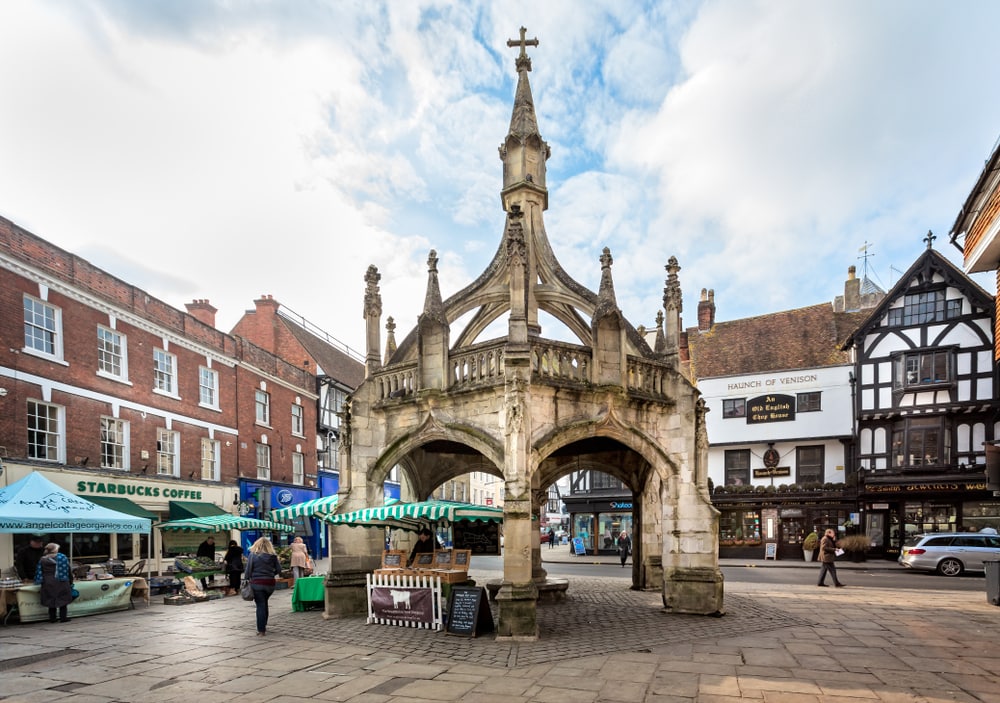
Over the years, the Poultry Cross has been used for a variety of different purposes, including as a place for public speeches and as a place for the proclamation of royal edicts. Today, it stands as a testament to the rich history of Salisbury and serves as a reminder of the city’s medieval past.
Salisbury International Arts Festival
The Salisbury International Arts Festival occurs from late May through June every year. It is a multiple-week-long event that is very popular event and attracts people from all over the world. The Festival features a diverse program of music, theatre, film, dance, spoken word, visual arts, family, and free events.

Larmer Tree Gardens
The garden takes its name from a magnificent landmark tree that stood on this site as early as the 10th century.
The origin of the word ‘Larmer’ is so ancient that it can only be guessed at. Originally spelt Lavermere, ‘Mere’ would certainly mean a boundary, while ‘Laver’ might have come from the Anglo-Saxon ‘Laur’, perhaps meaning Laurel. King John (1189-1216) hunted in this area many times and tradition states he met with his huntsmen under the branches of the Larmer Tree.
The Larmer Tree Gardens were created by General Pitt Rivers in 1880 and are an extraordinary example of Victorian extravagance and vision and offer now a unique and picturesque event and wedding venue. The gardens hold a unique collection of ornate buildings, ranging from the spectacular Singing Theatre to the magical Roman Temple.
Queen Elizabeth Gardens
The Gardens opened in the 1960s to commemorate the coronation of Queen Elizabeth II. Located just outside of the city centre the gardens combine formal plantings with a laid-back family picnic vibe.
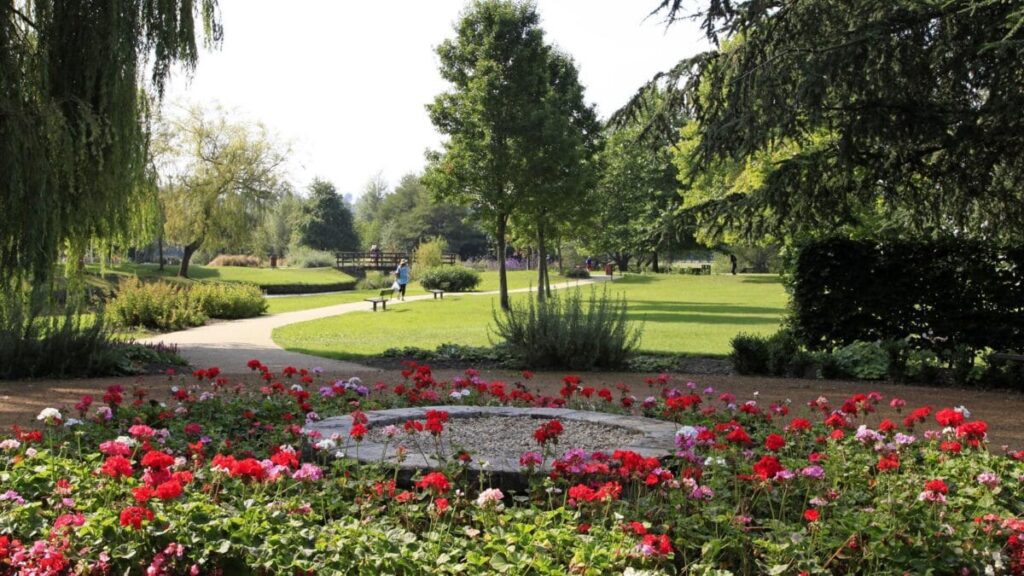
With famous views of the cathedral to the east and the River Avon to the south, Queen Elizabeth Gardens is perfect for those looking to appreciate the scenery or to take a break from the hustle and bustle of the city centre; continuing this, the park also provides access to the Town Path and a pretty walk past the water meadows out to Harnham.
Final thoughts about things to do in Salisbury
So there you have it, folks! Salisbury may be a small city, but it’s got a lot to offer. Whether you’re a history buff, foodie, or just looking for some good old-fashioned fun, there’s something for everyone here. And if all else fails, you can always take a stroll through the beautiful countryside and pretend you’re in your very own Jane Austen novel.
You might also like
Short breaks in Jersey: The Perfect Long Weekend in Jersey
Pin it to save it
